Inclusion makes visible and celebrates the diversity of children’s lives
(ACECQA, The Early Years Learning Framework for Australia V2.0, 2022)
The theme for 2023's Elevate conference came at a perfect time for those looking to boost their knowledge of equity, inclusion and cultural responsiveness, in line with the recently updated EYLF v2.0. We would like to pass on our deepest gratitude and thanks to our eight speakers, who put an immense amount of effort and personal energy into delivering an exceptional learning experience for those who attended.
Here are twelve tips and insights we took away from the sessions
Note: Please read on to the end and spend a minute contributing to our survey — we will be running another Elevate conference later this year (also with a theme around inclusion) and would greatly appreciate your input on what topics we should focus on.
Session 1: Relational frameworks
Presented by Lou Turner and Nancy Jeffrey from Emerging Minds
In this session, Lou and Nancy explored and unpacked the importance of creating relational settings within social environments and how this translates within early learning spaces for Aboriginal and Torres Strait Islander children, their families, and care structures.
Insight: There are three key themes underpinning a relational framework when looking to build relationships with Aboriginal and Torres Strait Islander families and communities.
These are:
- Individual practice – you must invest time in building relationships, and that starts with listening.
- Stories and experiences – it's vital to build an understanding and show acknowledgement of each child and family's individual stories. You will need to learn to be OK with a level of being uncomfortable as you go through this learning process, including understanding the historical and contemporary impacts of colonisation and the resulting intergenerational trauma.
- Organisational considerations – you are important in advocating for holistic needs alongside each child's family and community. This is a chance to put your RAP (Reconciliation Action Plan) words into action.
Tip: Explore the Emerging Minds website for a wealth of information on this topic
Emerging Minds has a large array of free resources and toolkits to support educators and organisations in their work with Aboriginal and Torres Strait Islander children and families.
Session 2: Gender Expansiveness – Going Beyond Gender Neutral
Presented by Dr Rachel Chapman, Melbourne Polytechnic
Dr Chapman explored what it looks like to go beyond gender neutral in practice, unpacking many of the questions and answers surrounding the role of early childhood educators in supporting children’s gender identities.
Insight: Gender-expansive approaches give children the opportunity to express their gender identities, play preferences and interests freely.
These approaches are different to gender neutral, which takes a binary view of gender. Gender-neutral practice is a great starting point but can be problematic if educators attempt to erase gender from their settings and don't go beyond gender-neutral.
Tip: Make space for identity to be explored.
The updated Early Years Learning Framework states that: "Educators who are committed to equity recognise that all children have the right to participate in inclusive early childhood settings, regardless of their circumstances, strengths, gender, capabilities or diverse ways of doing and being". (EYLF 2.0, ACECQA, 2023)
Dr Chapman challenged educators to think about how we can give children opportunities (both physically and environmentally) to express their gender identities, play preferences and interests freely.
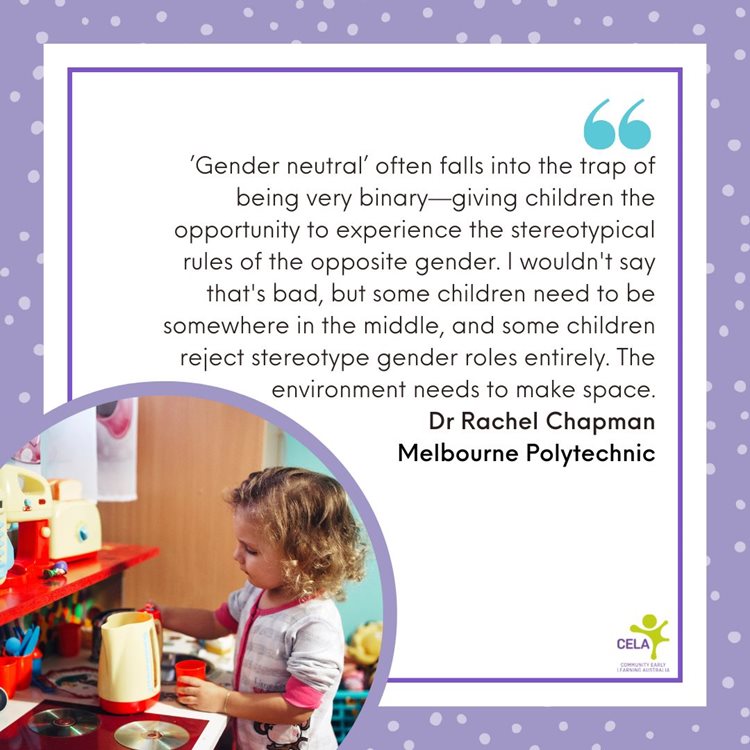
Session 3: Beyond The Rainbow: Connecting, supporting and empowering diverse families
Presented by Scott Brunelle and Marly Greenwood – Rainbow Families
Scott and Marly highlighted that all families are different; some are single parent, some have step parents, some are foster families, and some have LGBTQ+ parents. They shared suggestions around how to proactively design environments that are welcoming for all families and how to plan for education on family diversity.
Insight: Understand that inclusion is an obligation, not an option.
We have a professional, moral and ethical obligation to ensure that all children and families are included. Equity, inclusion and high expectations are key principles of the EYLF. Our approved frameworks clearly outline what is required in principles, practices, and learning outcomes for all families.
Tip: When challenged on aspects of inclusive practice by parents or educators who may find these aspects at odds with their personal opinions, lean on approved frameworks and organisational policies for support.
A question was asked about what educators can do when parents challenge certain aspects of inclusion in their service (eg: having a rainbow flag in the window, reading books about families with two dads/mums or organisational approaches to mother's day/father's day). Marly suggested that educators can lean on official service documents to advocate for commitment to quality improvement and change in the area of inclusion and to bear in mind that inclusion for all children is an obligation.
Session 4: Culturally embedded practice
Meni Tsmabouniaris, Diversity Kids
Meni shared lots of tips to help educators plan and deliver a culturally inclusive program where all children feel included, welcome and have a sense of belonging.
Insight: A great mantra to follow is "Before I am able to be, to belong and become, I need to be included."
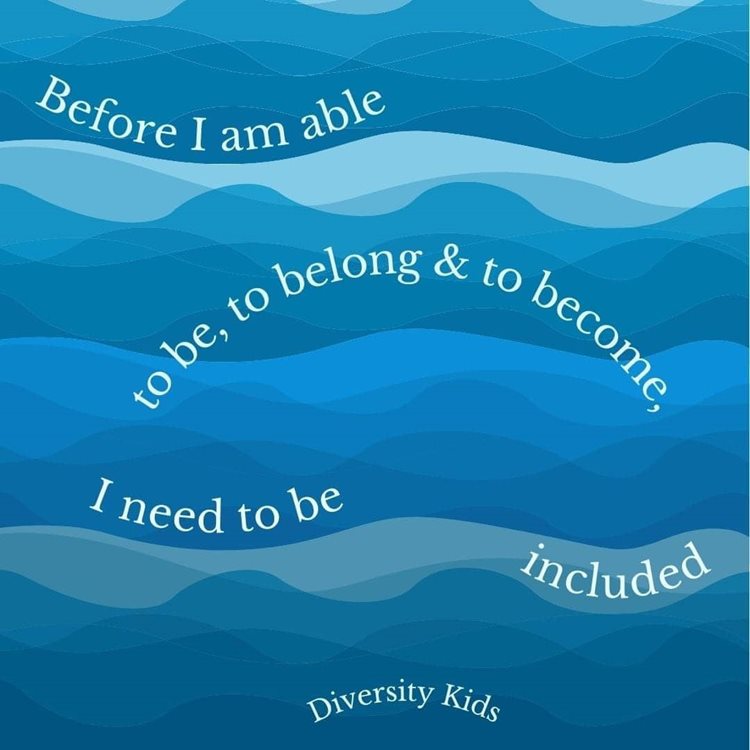 Tip: Look for the deep culture, not just surface culture.
Tip: Look for the deep culture, not just surface culture.
Deep culture is 90% of what we do not see, and understanding this is vital to a child's sense of being and belonging. This can include gestures, facial expressions, greetings, body language, attitudes towards authority and emotions and approaches to parenting and problem-solving. Cultural responsiveness is characterised by continued learning and commitment to improving practice in this area.
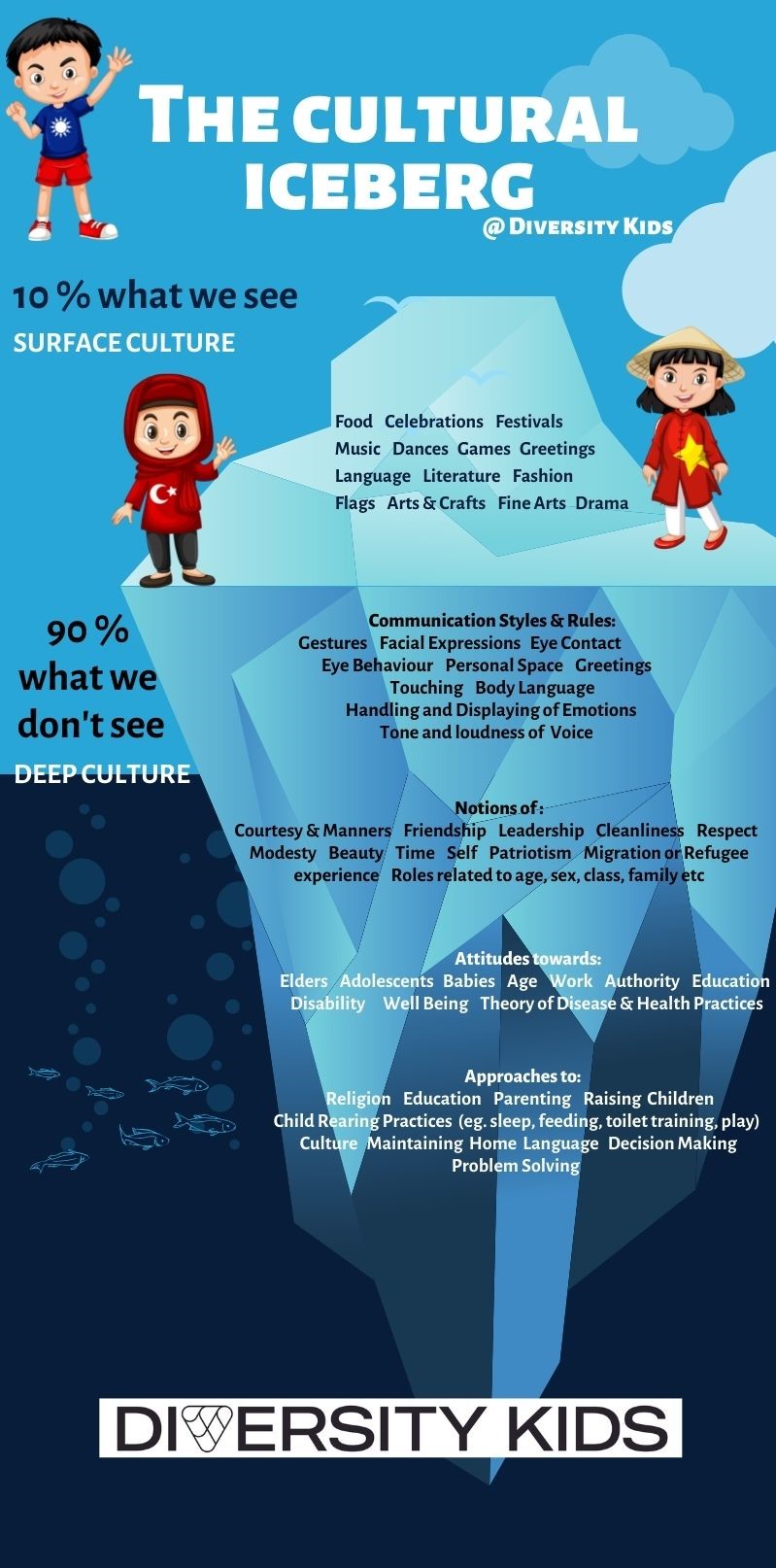.jpg?width=750&height=1515)
Session 5: Understanding child mental health
Presented by Helen Francis, Emerging Minds
Helen provided strategies and resources for supporting children's mental health and highlighted the importance of acknowledging mental well-being in children
Insight: Child mental health can be seen as a resource and is different to child mental illness.
Take the opportunity to reflect on what child mental health can look like and how we can support it. It's about a child who plays, is curious and engaged with others, expresses their feelings, understands what's going on around them and is resilient.
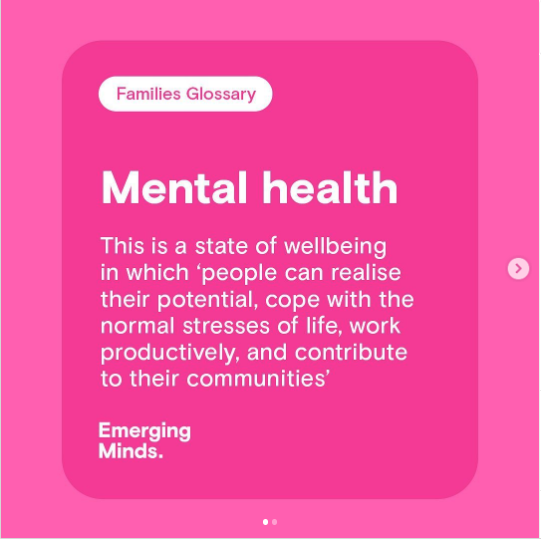
Insight: It's time to revisit our responses and reactions to big emotions in children.
When a child is demonstrating big emotions, as a society, we have been invited to think that this child is "behaving badly". At Emerging Minds, they are trying to get everyone to start saying, "I wonder what it is that this child is experiencing and how is what's happening to this child impacting on them today."
This practical session provided strategies and resources for supporting children's mental health in an early education service and highlighted the importance of acknowledging mental well-being in children.
Session 6: Play therapy
Presented by Anna Charleston, Bill Crewes Foundation
Anna provided insight into trauma informed practices and strategies you can implement to help children heal from trauma.
Insight: Play therapy is an age-appropriate, early intervention therapy using the child's natural language of play to help them make sense of their experiences, feelings and thoughts.
In play therapy, how children play and use toys is comparable to how adults choose words to express themselves in talk-based therapy.
Tip: Relationships are the agents of change. Being with a regulated adult will naturally help to lower the child's activation.
Relational safety is key to learning environments. Children are still developing their ability to self-regulate. This means when they start to get dysregulated, they need to be close to a regulated adult for co-regulation.
As the adult, you must be regulated, mindfully aware and connected to self. Take deep breaths and feel grounded.
- Proximity: Get down to the child's level and be close to them. Imagine you are their anchor.
- Attunement: Match their energy. If you can't find the right words, just wonder how they are feeling, and they will get a sense from you.
More resources on this topic:
Amplify! Should we be talking with children about skin colour?
Amplify! Embedding Aboriginal cultural perspectives in your service
Amplify! How to honour cultural occasions respectfully, plus a reflection on a vibrant Diwali celebration
Play therapy UK: How does play therapy work?
Emerging Minds: Anxiety in toddlers and preschoolers
CELA calendar training relating to this topic
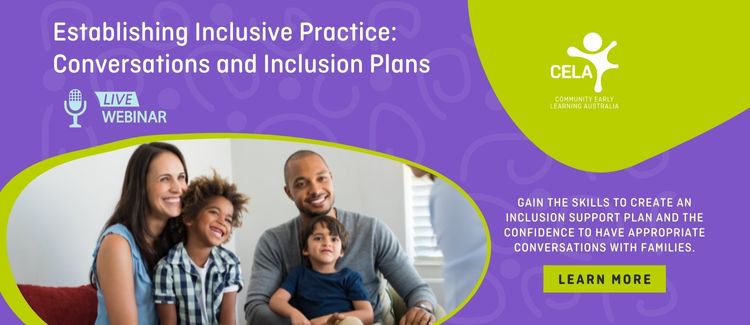
FIND OUT MORE